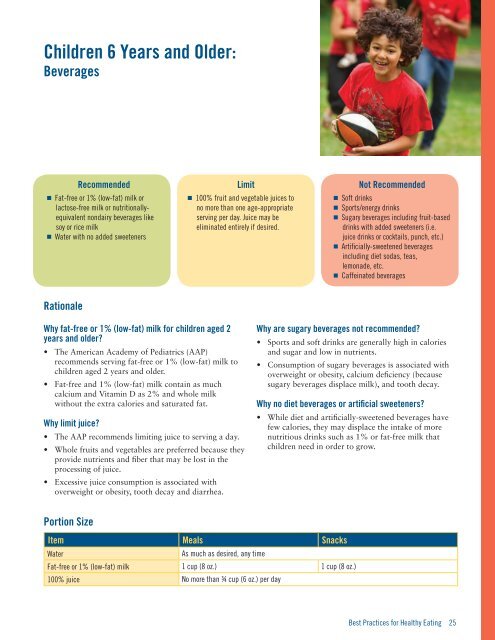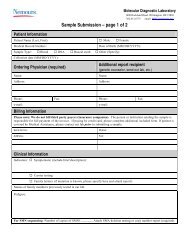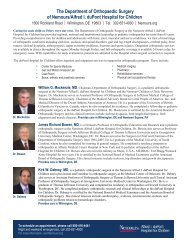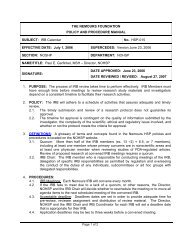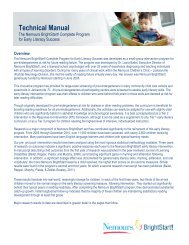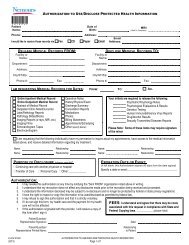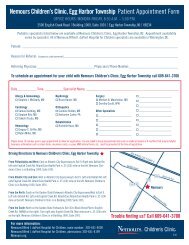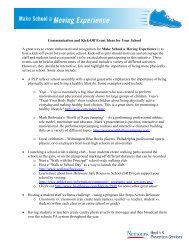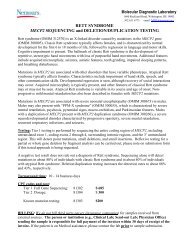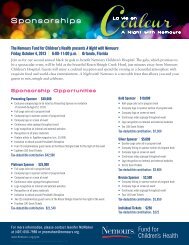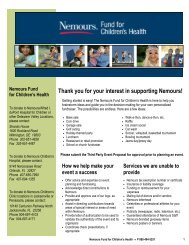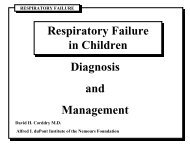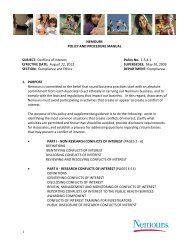Best Practices for Healthy Eating Guide - Nemours
Best Practices for Healthy Eating Guide - Nemours
Best Practices for Healthy Eating Guide - Nemours
You also want an ePaper? Increase the reach of your titles
YUMPU automatically turns print PDFs into web optimized ePapers that Google loves.
Children 6 Years and Older:<br />
Beverages<br />
Recommended Limit Not Recommended<br />
n Fat-free or 1% (low-fat) milk or<br />
lactose-free milk or nutritionallyequivalent<br />
nondairy beverages like<br />
soy or rice milk<br />
n Water with no added sweeteners<br />
n 100% fruit and vegetable juices to<br />
no more than one age-appropriate<br />
serving per day. Juice may be<br />
eliminated entirely if desired.<br />
n Soft drinks<br />
n Sports/energy drinks<br />
n Sugary beverages including fruit-based<br />
drinks with added sweeteners (i.e.<br />
juice drinks or cocktails, punch, etc.)<br />
n Artificially-sweetened beverages<br />
including diet sodas, teas,<br />
lemonade, etc.<br />
n Caffeinated beverages<br />
Rationale<br />
Why fat-free or 1% (low-fat) milk <strong>for</strong> children aged 2<br />
years and older<br />
• The American Academy of Pediatrics (AAP)<br />
recommends serving fat-free or 1% (low-fat) milk to<br />
children aged 2 years and older.<br />
• Fat-free and 1% (low-fat) milk contain as much<br />
calcium and Vitamin D as 2% and whole milk<br />
without the extra calories and saturated fat.<br />
Why limit juice<br />
• The AAP recommends limiting juice to serving a day.<br />
• Whole fruits and vegetables are preferred because they<br />
provide nutrients and fiber that may be lost in the<br />
processing of juice.<br />
• Excessive juice consumption is associated with<br />
overweight or obesity, tooth decay and diarrhea.<br />
Why are sugary beverages not recommended<br />
• Sports and soft drinks are generally high in calories<br />
and sugar and low in nutrients.<br />
• Consumption of sugary beverages is associated with<br />
overweight or obesity, calcium deficiency (because<br />
sugary beverages displace milk), and tooth decay.<br />
Why no diet beverages or artificial sweeteners<br />
• While diet and artificially-sweetened beverages have<br />
few calories, they may displace the intake of more<br />
nutritious drinks such as 1% or fat-free milk that<br />
children need in order to grow.<br />
Portion Size<br />
Item Meals Snacks<br />
Water<br />
As much as desired, any time<br />
Fat-free or 1% (low-fat) milk 1 cup (8 oz.) 1 cup (8 oz.)<br />
100% juice No more than ¾ cup (6 oz.) per day<br />
<strong>Best</strong> <strong>Practices</strong> <strong>for</strong> <strong>Healthy</strong> <strong>Eating</strong> 25


